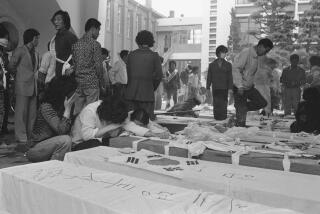Erich Koch, Regarded as One of Cruelest of Hitler’s SS Men, Dies in Prison at 90
- Share via
WARSAW — Erich Koch, a Nazi war criminal who was accused of the death of millions while serving as governor of East Prussia and commissar for the Soviet Ukraine during World War II, has died in a Polish prison, the official news agency PAP reported Friday. He was 90.
A lieutenant general in the SS, Hitler’s dreaded security service, Koch, who died Wednesday, was the only Nazi war criminal held by Poland and one of the Third Reich’s most senior imprisoned leaders. He was the most senior Nazi remaining in captivity after Adolf Hitler’s deputy, Rudolph Hess, now 92, who is still serving a life sentence in West Berlin’s Spandau Prison.
Regarded as one of the cruelest of Hitler’s Nazi administrators, Koch was sentenced to death by a Polish court on March 9, 1959, for killing 72,000 Poles and sending about 200,000 others to labor camps.
His death sentence was never carried out because of his poor health. Under Polish law, condemned criminals cannot be executed if they are in bad health.
4 Million Deaths
In the Soviet Union, Koch was alleged to have been responsible for the deaths of 4 million Russians and Jews and sending 2 million people into forced labor.
Koch’s cruelty was matched by that of his wife, Ilsa, the notorious “Bitch of Buchenwald,” the concentration camp that was for a time commanded by her husband. She was feared for her sadistic treatment of prisoners and for having selected camp inmates murdered so that lamp shades could be made from their tattooed skin.
In 1951, a West German court sentenced her to life imprisonment for murder. She committed suicide in a Bavarian prison in 1967.
Many German civilians living in East Prussia blamed Koch for delaying their evacuation during the German military collapse and held him responsible for the death from starvation and exhaustion of as many as 500,000 of them.
Unrepentant to the Last
An unrepentant Nazi to the last, Koch spent his last 27 years in a book-lined solitary cell in the village of Barczewo in northeastern Poland, the territory he once controlled. He was described as being keenly interested in politics and economics, reading in both German and English, and also was said to speak good Polish.
People who saw Koch in prison said he exercised and described him as having gray hair combed flat to one side and a small mustache similar to Hitler’s.
He was turned over to Poland by Britain in 1950 after his capture near Hamburg, West Germany, where he lived under the name Rolf Berger.
He was governor of East Prussia beginning in 1939 and administrator of the Ukraine in 1942, according to Jacek Wilczur, member of the Main Commission for the Investigation of Nazi Crimes in Poland.
“He was an old, sick man, and he simply died,” Wilczur said in a telephone interview. “This is the last of the (Nazi) criminals serving their sentences here in Poland.”
Allegedly Took a Fortune
Koch allegedly amassed a personal fortune from Nazi plunder, partly from his reported responsibility for overseeing transport of artwork and material from Warsaw to Germany after the defeat of Polish fighters in the 1944 Warsaw uprising.
His brazen plundering and use of concentration camp inmates for his private benefit offended even the Nazi authorities, and he was tried before a Nazi SS court on charges of corruption in 1944. He was sentenced to death but was reprieved and restored to favor.
He was long rumored to have knowledge of the whereabouts of the “Amber Chamber,” a room said to be lined with the yellow fossilized coal resin of the East Prussian Baltic coast.
However, Czeslaw Pilichowski, the former head of the Polish Nazi war crimes commission, said in an interview with the Associated Press in 1984 that the rumors were untrue.
Make for Prussian King
The superbly carved amber panels that lined the room were made in the 18th Century in Gdansk, formerly Danzig, at the request of a Prussian king. The king’s son presented them to the Russian czar who installed them at Tsarskoie Selo, a summer house near Leningrad.
The Nazis took the panels during the war, claiming rights to Prussian heritage, and they vanished without a trace.
“He (Koch) has the mentality of a gauleiter (Nazi governor), possessed by Hitler’s ideology,” Pilichowski said. “And if you talked to him now, he would say, ‘I am a prisoner, all right, but in an hours’ time I shall be a gauleiter again.’ ”
More to Read
Sign up for Essential California
The most important California stories and recommendations in your inbox every morning.
You may occasionally receive promotional content from the Los Angeles Times.













